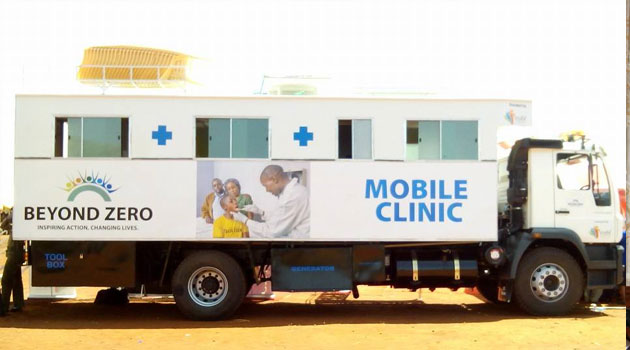GE Healthcare and Beyond Zero Initiative are teaming up to improve access to quality and affordable primary healthcare services in Kisumu County
GE Healthcare (www.GEHealthcare.com) is participating in the 2nd Beyond Zero Medical Safari to provide antenatal, fetal, and cardiovascular healthcare services in Kisumu County; GE Healthcare is focused on primary and referral care initiatives that improve access to quality and affordable care through medical technologies as well as training and capacity building of healthcare professionals.
GE Healthcare and Beyond Zero (www.BeyondZero.or.ke) Initiative are teaming up to improve access to quality and affordable primary healthcare services in Kisumu County. In the second Beyond Zero Medical Safari, GE Healthcare is providing antenatal screening for expectant women, fetal monitoring, and ECG screening for early detection of cardiovascular anomalies, as well as vital signs monitoring.
Since 2014, Beyond Zero has been working to promote access to quality maternal and neonatal healthcare services across the country. The initiative has rolled out mobile clinics in 47 counties that provided integrated services such as HIV testing, treatment and care, immunization and basic treatment for common ailments. In 2018, Beyond Zero launched its 2nd strategic framework which is anchored in the principle of leaving no one behind and adopts a life-cycle approach targeting pregnant women and newborns, infants and children, adolescents and young people, men, and older persons. According to Beyond Zero, the 2nd strategic framework will catalyze action for equitable provision of health, build partnerships and synergies to mobilize Kenyans, leverage the first lady of Kenya’s convening power for multi-disciplinary mobilization for results and enhance leadership, commitment and accountability.
Speaking at the Beyond Zero Medical Safari in Kisumu, First Lady Margaret Kenyatta said that the achievement of universal healthcare coverage is possible with the right public-private partnerships.
“Our common goal of providing equitable access to quality and affordable health services for every Kenyan is achievable with the participation of a diverse network of stakeholders in the public, private and not-for-profit sectors. Strengthening primary healthcare is a critical component towards achieving universal health coverage in Kenya,” said First Lady Margaret Kenyatta.
Andrew Waititu, General Manager, GE Healthcare, East Africa said GE is proud to support better health outcomes for all in Kenya.
“GE Healthcare is keen to collaborate with all counties to support the goal of ensuring access to quality and affordable healthcare services for Kenyans. Focusing on innovative delivery models, appropriate technologies, impactful partnerships as well as building skills for healthcare professionals, GE Healthcare is driven to deliver sustainable primary healthcare solutions in the country,” Waititu said.
Adequate and appropriate care delivered by well-trained personnel is an imperative for any health system to deliver on national and global healthcare commitments such as Universal Health Coverage.
In September, nurses and clinical officers in Kisumu County received 70 hours of training on the use of GE Healthcare’s portable handheld ultrasound device designed to help primary healthcare workers estimate gestational age, better plan and manage pregnancies, and conduct examinations that may result in the early detection of potentially life-threatening pregnancy complications. Programs such as these will help sustain the efforts delivered during the beyond Zero Safari.
Over the past three years, GE has implemented and is implementing 17 similar primary healthcare (PHC) programs that link care from “community to the hospital” in seven countries. GE implements its PHC programs via a collaborative framework of strategic partners and stakeholders that includes governments, funding agencies, professional associations, local NGOs, academic institutions, among others. These programs, in Ethiopia, Ghana, Kenya, Nigeria, Sierra Leone, South Africa, and Tanzania have delivered measurable impact in terms of improved maternal and newborn outcomes; over 100,000 expectant women and newborns have directly benefitted; and trained, including task shifting, over 1,100 primary healthcare workers, including community health workers, midwives, nurses, and clinical officers.



















